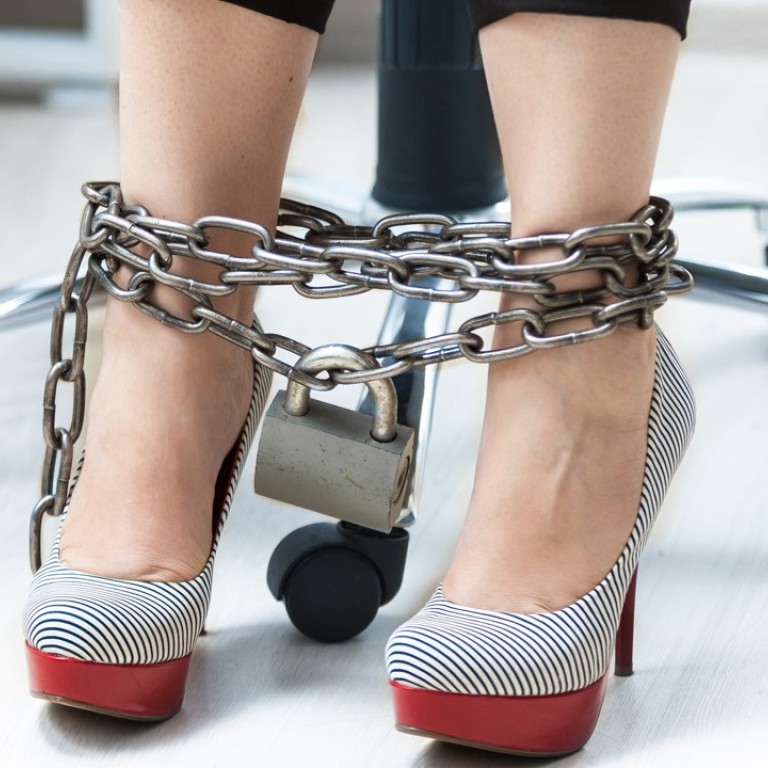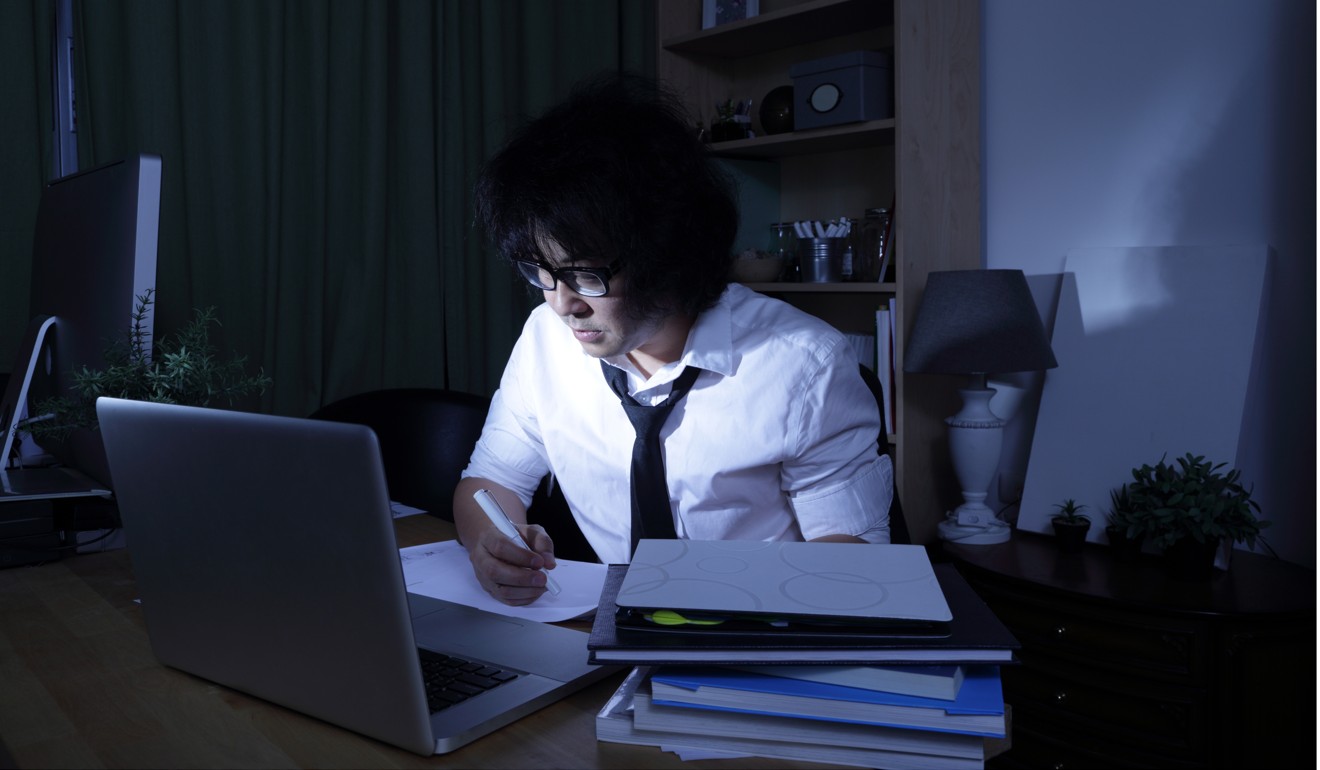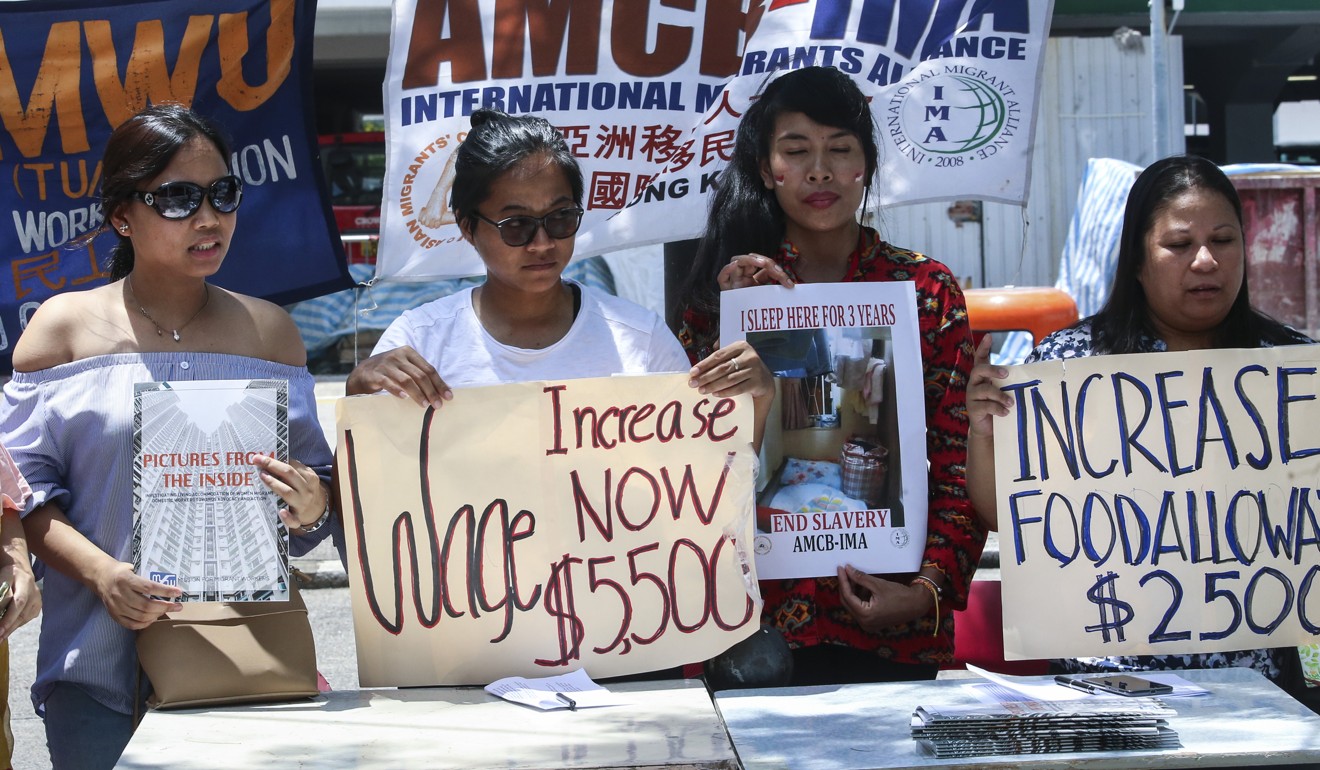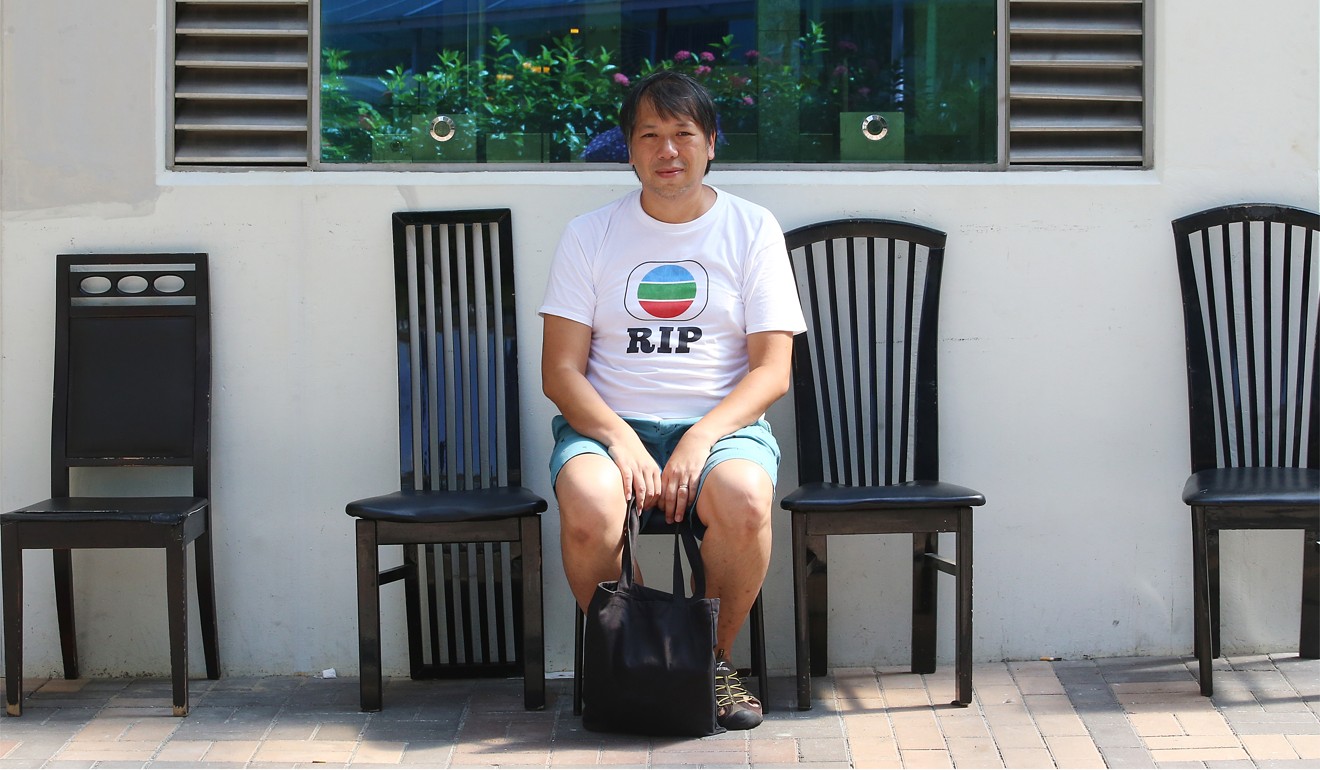
Workers, know your rights, experts say, after high-profile labour disputes hit Hong Kong
Employees in the city are often left open to abuse, labour experts say, and there is an unwillingness to turn to the courts for help
Hong Kong’s workers remain at risk of exploitation because most do not know their rights, leaving them vulnerable to employers’ sometimes unreasonable demands, experts have said.
Within the last decade, rows have erupted at workplaces in which employees have complained they lacked adequate freedoms and even basic human rights, despite the special administrative region being a signatory to 41 international labour conventions.
In the latest high-profile dispute, the employer of a foreign domestic worker sparked outrage after sharing an angry post on Facebook in which she condemned her employee for keeping the air conditioning on in her room overnight without her permission, despite temperatures exceeding 30 degrees Celsius. The woman, surnamed Wong, described her employee as “audacious to the extreme” and threatened to remove the air conditioning switch.
There was also a report this week on a foreign domestic helper having her toilet time restricted to three minutes and even needing approval to use the bathroom.

The case reignited debate over the vague nature of employment contracts for Hong Kong’s foreign domestic workers, who are often exploited as a consequence.
Aside from domestic workers, employees in Hong Kong more broadly are often not aware of their employment rights, leaving them open to abuse, labour experts have said.
Last year, a survey by Hong Kong’s equality watchdog exposed the patchy knowledge held by workers in this area, as almost 40 per cent of 1,713 respondents wrongly thought Hong Kong had discrimination laws protecting people on the grounds of sexual orientation, age and new immigrant status.
Andrea Randall, a partner at Gall Solicitors in Hong Kong who previously practised in Britain, last week said she remained doubtful most Hongkongers were aware of their employment rights.
“Hongkongers aren’t always aware of their legal rights, entitlements and remedies,” she said. “It does surprise me; people’s understanding. [Hongkongers] are perhaps not as litigious as in other countries such as America. But that said, a balance does need to be struck. Ultimately there will be a commercial decision whether to pursue a case in court.”
She said that when advising her clients, many of whom worked in financial services, she always considered the strength of their claim before suggesting they should take legal action against an employer.
“If we look at protections for the city’s employees as a whole, they fall far behind other jurisdictions such as England,” she said. “There, for instance, courts are obliged to consider in a case of termination whether the decision of the employer to dismiss the employee falls within the band of reasonable responses which ‘a reasonable employer might have adopted’. This test does not apply in Hong Kong.”
She said that particularly in cases with a group of plaintiffs, it was sometimes preferable for employees to engage in mediation talks in order to potentially reach out-of-court agreements and settlements.
“If the case affects a large group of people, then you have strength in numbers,” she said. “I think you should expect any calm discussions to come before any legal action. Achieving that resolution is always going to be preferable. But if the parties cannot come to a reasonable agreement then the employee might want to seek relief through the courts.”

Labour Advisory Board member Chau Siu-chung, who represents employees, said the controversy over standardising working hours showed Hong Kong’s labour rights still lagged behind other developed cities.
He said employees were often in a weaker position as they did not have collective bargaining power, unlike powerful labour unions in European countries.
“When it comes to disputes at work, employees don’t have much choice; they either continue to do their job or quit,” he said.
Last year, the Labour Department handled 14,727 claims and disputes, which marked a marginal increase from the previous year (14,441) but was still less than in 2014 when there were 15,832 cases. Most of the 2016 cases were related to disputes on termination and wages, a department spokesman said. More than 70 per cent of the cases with conciliation services rendered were settled.
During the same year, there were three major industrial strikes, although the average number of working days lost remained among the lowest in the world.
In December, artist Luke Ching Chin-wai launched a labour rights campaign for cashiers in supermarkets and convenience chain stores, including Wellcome, Mannings and Circle K, demanding employers give their employees seats during their shifts.
Ching wrote letters to bosses complaining that they did not provide workers with chairs, which he argued should be considered a basic labour, or even human, right.

“By providing them a seat, it shows employers are respectful and supportive of their staff,” Ching said. “Workers might not take the seat in the end, but at least they have the right to choose whether or not to sit.”
Ching’s campaign for cashiers echoed a similar one in 2007 in which he fought for security guards, mostly in art museums and galleries, who were not given seats. He said he recalled that at the time, the public was debating a statutory minimum wage.
Not many people noticed the importance of occupational safety and health
“They were talking about only a HK$1 or HK$2 dollar difference,” he said. “But not many people noticed the importance of occupational safety and health. I think we all know people should be given a healthy and safe environment, but I am not sure why we are not aware of that when looking at people who wear work uniforms.”
As a result of his two campaigns, security guards at public art museums under the government’s Leisure and Cultural Services Department are now given a seat as standard, as well as cashier staff in most supermarkets and convenience chain stores.
But he said the change should have been made by the Labour Department instead, as there were many other workers in the retail industry that he could not cover with his own effort.

Labour sector lawmaker Ho Kai-ming said there should be a review of labour regulations, as the legal definition of occupational disease did not cover many other health problems that arose from workplaces, such as varicose veins in the lower legs, a common problem faced by workers who are required to endure long hours standing up.
Figures from the Labour Department showed the number of cases of occupational diseases in Hong Kong dropped to 256 in 2015, from 267 in 2014. But Ho said the decline did not necessarily mean the situation had improved, adding that the current definition of occupational diseases was inadequate.
Meanwhile, in the public sector, Hong Kong schools have also been the setting for employment disputes. In 2010, teacher Kwong Ho-ying won an out-of-court settlement from the Hong Kong Chinese Women’s Club Fung Yiu King Memorial Secondary School after she was bullied for wearing a skirt instead of trousers and subsequently resigned from her job.
But in schools, it is not only employers who are accused of imposing unreasonable demands on workers; teachers have increasingly reported an apparently growing number of complaints from Hong Kong’s tiger parents.
In 2014, a study by the Federation of Education Workers revealed a case in which parents had demanded teachers allow a five-minute grace period in the mornings for late students because otherwise their sleep would be affected.
Parents also asked teachers to help change the school’s lunch provider because pizza was not included on the menu.
The poll of 442 teachers suggested they considered 64 per cent of the complaints they received to be “unreasonable requests”.
Mediation
While restrictions on employees are not always overt examples of abuse, many workers in Hong Kong experience unfair restrictions on their freedoms and their dignity.
According to the Employment Ordinance, employees are protected in the following areas: payment of wages, rest days, paid holidays and annual leave, sickness allowance, maternity and paternity leave, severance payments and union membership.
However, in Hong Kong there is no right to collective bargaining, meaning that the workforce deals with a take-it-or-leave-it attitude from employers. These conditions can be anything ranging from long working hours and no breaks to reduced wages.
Sometimes, however, it is less clear which side is at fault in a dispute.
The Hong Kong Professional Mediation Association offers experts in cases which cannot be easily resolved, estimating they resolve more than 80 per cent of their cases before court action.
Big companies pay between HK$5,000 and HK$20,000 for their services, but some mediators will work pro bono for smaller companies and individuals.
Mediator Lawrence Li said most of his cases related to dismissals, but other disputes were sparked by staff punctuality, patterns of sick leave and now increasingly unprofessional social media posts.
He said employees were sometimes naive about how their social media comments might be used against them in a dispute with an employer.
“Sometimes if staff are not happy with their work, they will put some comment on Facebook or Instagram about their workplace, just to vent their anger over something that has happened,” he said. “They consequently sometimes leak confidential information.”
Li said that during a mediation meeting, both parties will be given an equal amount of time to contribute to the discussion, while the mediator also holds private meetings with both sides.
He said the most complex cases to resolve were those involving senior staff members, even bosses, having romantic relations with staff members.
He said it was difficult to find a middle ground on which all parties would agree because personal feelings were involved, and the senior employee might use his or her power to exert control over subordinates.
“That can be very difficult to deal with,” he said.
Case studies
Mari, 25
“I came here to work when I was 18 so that my little brother and sister can go to university back home in Indonesia,” Mari said.
She has worked for the same employer for seven years, doing chores such as cooking, cleaning and looking after the family’s two children.
Though Mari has not been physically abused like in the cases of other domestic workers, she has been subject to discrimination because of her ethnicity and religion.
“I was told I’m not allowed to pray, even on Sundays when I have my day off,” Mari said. “When I follow the family to eat outside, I am always in charge of looking after the smallest boy. A few times, I have been told to finish the pork on his plate, even though it is against my religion to eat pork.”
Evelyn, 33
“When my father passed away last year, I was not allowed to take time off and go home to help with the funeral and pay my respects,” Evelyn said.
“My employers said that I had taken two weeks off the year before, so I was not allowed to take another break so soon after,” she added.
She has been working for the family for more than 10 years, and has experienced other injustices in the past, including occasionally not getting a full day off on Sundays and not being allowed to use her phone at home during “working hours”.
“Normally they are not bad to me,” Evelyn said. “But how can they refuse to let me pay respects to my father?”
She was not even allowed a day off on the day of her father’s death – she was told working helps to distract the brain.
Angela, 44
After moving to Hong Kong, Angela landed a job with what could only be said to be the ideal, “dream” employers.
“They were such a happy family,” Angela said. “For 20 years, I never heard the parents argue with each other; they respected me and each other.
“They always gave me the entire weekend off, they brought me back gifts when they went on holiday, and funded my plane tickets home each year.”
However, when the daughter in the family left for university, the employers felt it was not necessary to have additional help at home, and let Angela go.
Even though the family she now works for had been recommended by her previous employers, Angela’s life is drastically different.
“I am not allowed to eat until after they have all finished ... [and] they require me to wear a uniform,” Angela said. “I haven’t been allowed to go home in nearly two years.”



